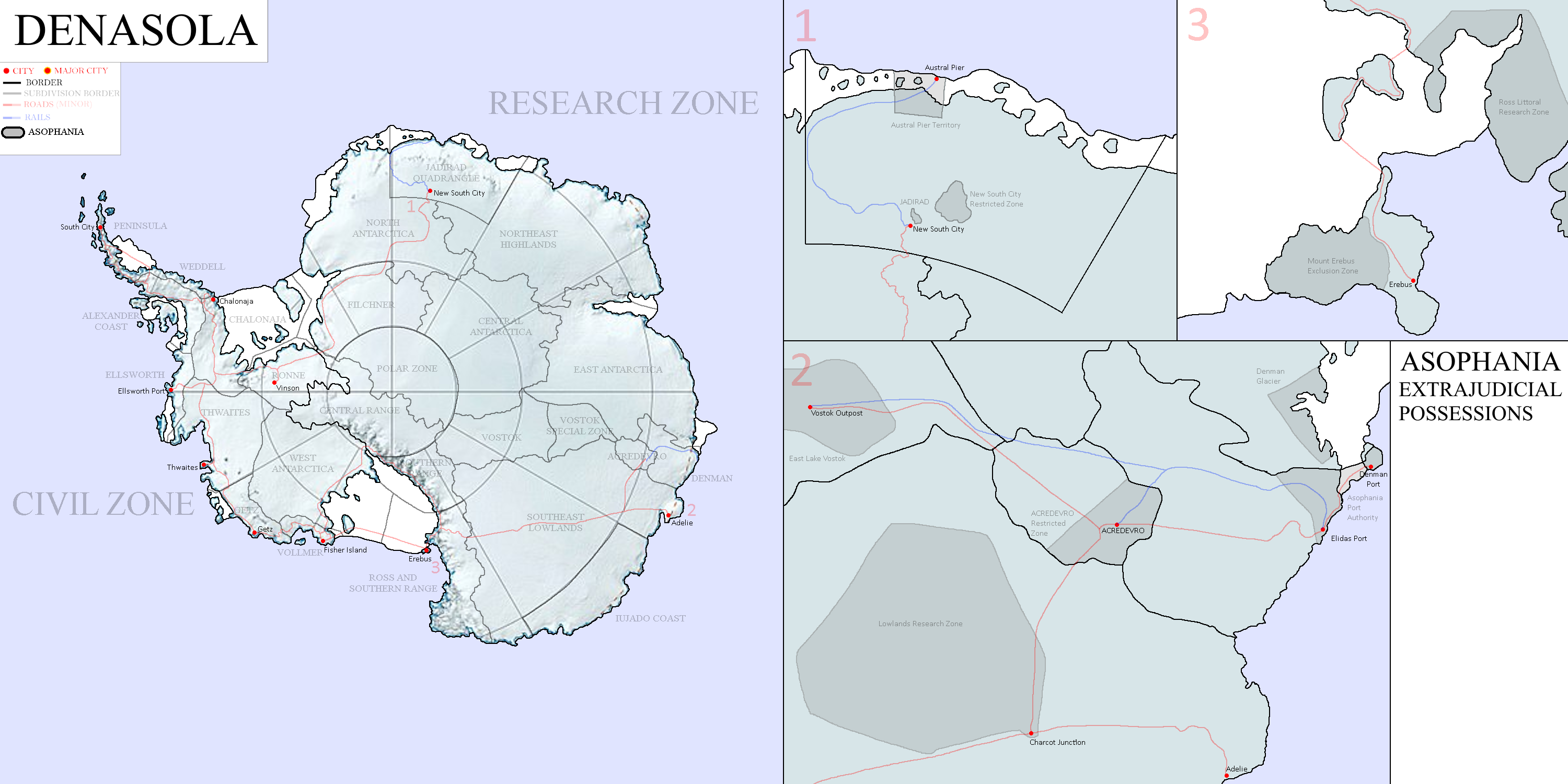Antarctic Protocol
| The Antarctic Protocol | |
|---|---|
 | |
| Type | Boundary Condominium |
| Signed in | 148 CE |
| Location | New South City, Asophania |
| Effective in | 148 CE |
| Conditions | Ratification of all parties, 5,000,000 Antarctic pound membership fees per annum |
| Parties | Initial signatories Asophania Denasola Islandia / Rapa Nui Additional signatories Carbon Iujadogia Arcoradia Theian Federation Yatan Commonwealth |
The Antarctic Protocol is a legally binding, multilateral treaty that officially divides and administers the continent of Antarctica. The treaty came into effect in 148 CE following ratification by its second foremost signatories - Asophania and Denasola, with Islandia also signing it a few years later. In summary, the Protocol oversees the division of Antarctica along the Transantarctic Range, with a free "civil zone" to the west and a "research zone" to the east. Its aims is to protect the environmental integrity of the continent for research. It also ensures that other nations are given the right to use the research zone, provided they abide by the Protocol and pay ₳5 million (Antarctic pounds) in membership fees to finance the administration and enforcement of the protocol.
Terms of the protocol
Article I
The continent of Antarctica shall be divided into a civil zone in Western Antarctica and a research zone in Eastern Antarctica, whose maritime borders extend to the 56th parallel south. Within the research zone, there shall be prohibited, among other things, any measures of military nature, such as the establishment of military bases and fortifications, the carrying out of military maneuvres, as well as the testing of any kind of weapons. The Protocol shall not prevent the use of military personnel and equipment for science. The Protocol shall oversee the democratic transition of power and sovereignty of the Antarctic continent from The Serene Republic of the South (Asophania) to the Antarctic Republic (Denasola). The Protocol respects the continued sovereignty of the government of Asophania as the government of Denasola deems suitable.
Article II
The freedom of scientific investigation and cooperation shall be upheld in the research zone, subject to the provisions of the protocol and the approval of all Protocol signatories. If any dispute occurs between two parties concerning the application of the Protocol, these contracting parties shall consult among themselves with a view to having the dispute resolved by negotiation, inquiry, mediation, conciliation, arbitration, judicial settlement, or other peaceful means of their own choice.
Article III
The Serene Republic of the South (Asophania) shall be granted special extrajudicial sovereignty that overrules Article II of the Protocol in the following areas:
- the New South City restricted zone, the Joint Asophanian-Denasolin-Islandian Research and Development complex, and the Austral Pier Territory
- the East Lake Vostok area, the Lowlands research zone, and the Asophanian-Carbon Research, Development and Reactor Operations facility, the Denman glacier, and the Asophanian Port Authority.
- the Mount Erebus exclusion zone, and the Ross Littoral.
The Antarctic Republic (Denasola) shall be granted special status within areas of the research zone that are administered as part of the civil zone. These are:
- the city of Adélie
- the city of Erebus
- the port of Elidas
- New South City
Article IV
The disposal of waste, pollution, and the testing of nuclear weapons are to be prohibited below the 56th parallel south as marked by Article I. Provisions are to be put in place to holistically manage the waste disposal needs of the sovereign state of Denasola and all parties residing within the civil and research zones as determined by Article V.
Article V
Imports, exports, the transportation of people and the deportation of waste shall be managed and delegated through allocated ports. Imports and exports shall be conducted on a regional basis as follows:
- Trade originating from the Atlantic Ocean shall use the port of Chalonaja
- Trade originating from the Indian Ocean shall use the ports of Austral Pier and Elidas.
- Trade originating from the Pacific Ocean shall use the ports of Erebus and Ellsworth.
The transportation of people are to be solely conducted through the ports of Chalonaja for access to the civil zone and the ports of Austral Pier and Elidas for access to the research zone. Alternatively, special access can be attained for transport to the port of Ellsworth for access to the research zone. The deportation of waste shall be solely managed through the port of Chalonaja for the civil zone and the port of Austral Pier for the research zone. The transportation of military personnel and materiel is to be solely conducted through the port of South City for the entirety of the continent.
Article VI
There shall be a means to which any signatory can revoke the terms of the Protocol at any time, provided that there is a supervised withdrawal from the research zone. Furthermore, if it is apparent that a party has breached the terms of the Protocol, and given that there is mutual agreement of at least one third of signatories toward this matter, a signatory may be investigated for expulsion from the Protocol. If this investigation proves that the Protocol has indeed been breached, the signatory shall be revoked from the Protocol, ushering in a supervised withdrawal.